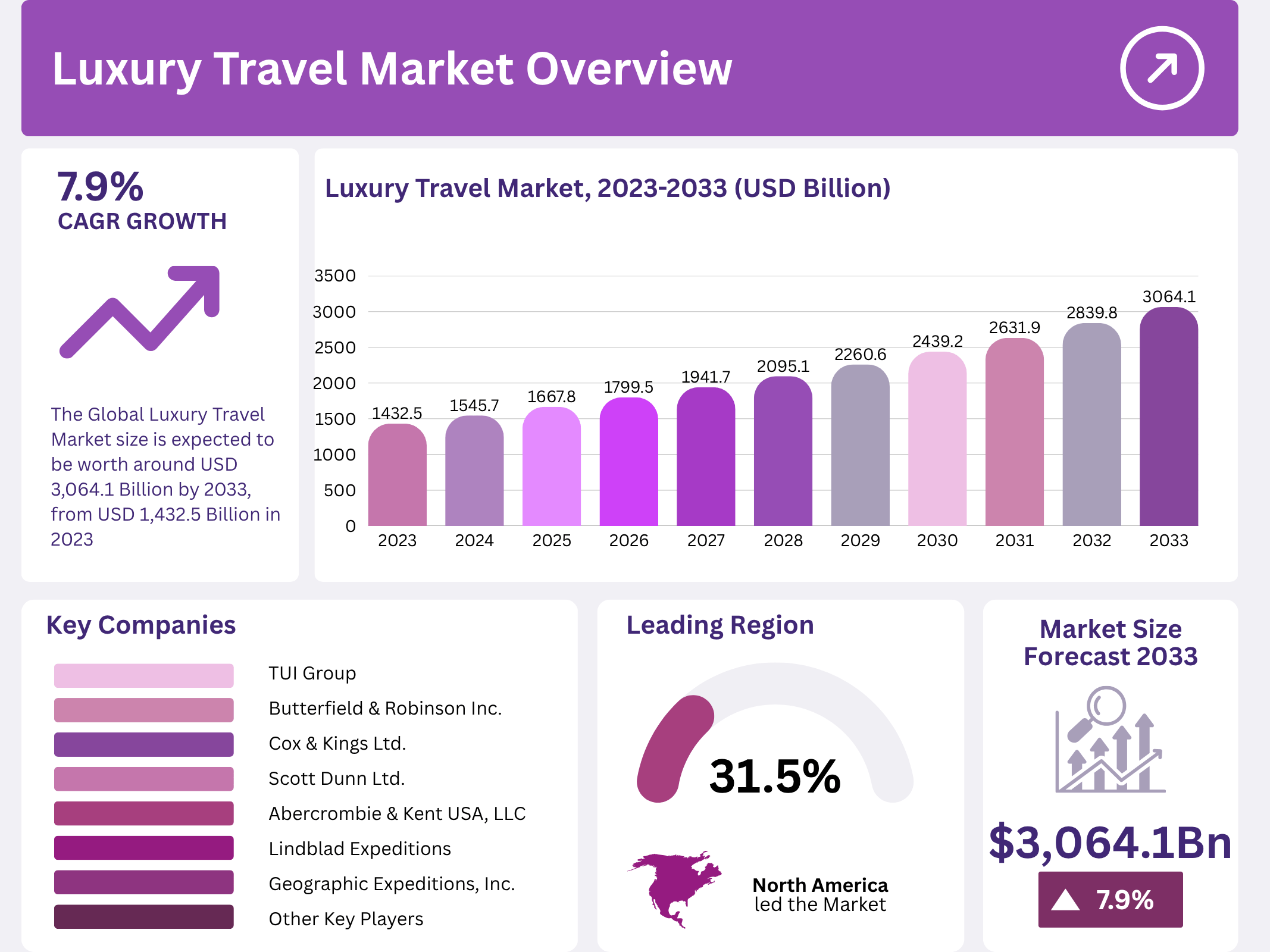
Quick Navigation
Introduction
The Global Luxury Travel Market is witnessing transformative growth as affluent travelers increasingly seek exclusive, high-quality, and personalized experiences. Valued at USD 1,432.5 Billion in 2023, the market is projected to reach USD 3,064.1 Billion by 2033, growing at a remarkable CAGR of 7.9% from 2024 to 2033.
North America remains the dominant region, holding a 31.5% market share and generating USD 451.2 Billion in revenue in 2023. The industry thrives on rising global wealth, sustainable travel trends, and digital innovation that enhance exclusivity, comfort, and eco-consciousness.
As luxury tourism evolves, travelers prioritize immersive, sustainable, and technology-driven experiences. This evolution is redefining luxury travel as a blend of indulgence, responsibility, and cultural authenticity, positioning it as one of the most dynamic sectors in global tourism.

Key Takeaways
- The Global Luxury Travel Market size is expected to be worth around USD 3,064.1 Billion by 2033, from USD 1,432.5 Billion in 2023, growing at a CAGR of 7.9% during the forecast period from 2024 to 2033.
- In 2023, Safari & Adventure held a dominant market position in the By Tour segment with a 35.2% share.
- In 2023, the 41-60 Years age group held a leading position with a 43.2% share.
- North America dominated with a 31.5% market share and USD 451.2 Billion in revenue.
Market Segmentation Overview
By Tour type, the Safari & Adventure segment led the market in 2023, capturing a 35.2% share. This growth stems from the rising demand for immersive, high-comfort experiences blending adventure with luxury, including African safaris, Arctic explorations, and eco-lodge stays.
By Age Group, travelers aged 41-60 years dominated with a 43.2% share, reflecting their financial stability and preference for premium travel options. This segment drives demand for exclusive destinations, high-end resorts, and personalized itineraries that emphasize cultural and environmental experiences.
Drivers
Rising Global Affluence: Increasing disposable incomes and wealth accumulation among high-net-worth individuals and the upper-middle class have significantly expanded the luxury traveler base. This financial growth has fueled spending on customized travel experiences, exclusive resorts, and destination events worldwide.
Technological Advancements: Innovations such as AI-driven personalization, digital booking platforms, and virtual reality destination previews enable companies to deliver seamless, bespoke travel experiences. These technologies cater to modern travelers seeking convenience, exclusivity, and customization.
Use Cases
Personalized Safari Expeditions: Luxury operators now offer fully customized safaris that integrate private guides, eco-lodges, and tailored cultural encounters. These bespoke adventures cater to travelers who prioritize exclusivity and sustainability in exotic locations like Tanzania and Botswana.
Luxury Wellness Retreats: Affluent consumers increasingly opt for high-end wellness getaways combining relaxation with holistic well-being. Luxury resorts integrate spa therapies, mindfulness programs, and organic cuisine to create health-centric experiences aligned with global wellness trends.
Major Challenges
Economic Instability: The luxury travel sector is highly sensitive to global economic fluctuations. Recessionary pressures or geopolitical uncertainties can reduce discretionary spending, directly affecting travel frequency and luxury tour bookings.
Environmental Concerns: Growing awareness of carbon emissions and ecological footprints challenges luxury operators to adopt greener practices. This demand for sustainability increases operational costs and requires continual innovation in eco-friendly travel offerings.
Business Opportunities
Eco-Luxury Travel Expansion: The rise of environmentally conscious high-income travelers presents significant opportunities for eco-resorts, sustainable aviation, and carbon-neutral experiences. Providers embracing circular tourism models will attract the next generation of responsible luxury travelers.
Integration of AR/VR Technology: Leveraging augmented and virtual reality for immersive previews and remote planning enhances consumer engagement. These tools allow travelers to visualize destinations in advance, boosting confidence in high-value travel purchases.
Regional Analysis
North America: With a 31.5% market share and USD 451.2 Billion in 2023, North America leads due to strong consumer purchasing power and growing interest in exclusive, tech-enabled experiences. High adoption of sustainable luxury resorts and private charters further supports regional dominance.
Asia Pacific: The fastest-growing region, driven by rapid urbanization, wealth creation, and an expanding affluent middle class in China, Japan, and South Korea. Asia Pacific’s luxury market emphasizes personalized, culture-rich travel and is projected to show robust double-digit growth through 2033.
Recent Developments
- August 2023: Lindblad Expeditions introduced a new ship for polar expeditions, enhancing capacity by 200 passengers and reinforcing its position in wildlife-focused luxury cruises.
- June 2023: Scott Dunn Ltd. launched its exclusive “Cultural Immersion” series, offering deeper engagement with local communities and traditions in luxury destinations.
- April 2023: Abercrombie & Kent USA acquired a boutique travel agency to expand bespoke luxury adventure tours in South America.
Conclusion
The Global Luxury Travel Market stands at the forefront of a transformative era defined by sustainability, personalization, and digital sophistication. As it approaches USD 3,064.1 Billion by 2033, the industry will continue to evolve around affluent consumers’ desire for meaningful, eco-friendly, and technologically enhanced travel experiences.
With major players such as TUI Group, Butterfield & Robinson Inc., and Cox & Kings Ltd. driving innovation through sustainability and digital integration, the market’s future promises elevated standards of exclusivity and responsible luxury. This convergence of experience, ethics, and technology ensures continued expansion across global luxury travel landscapes.










